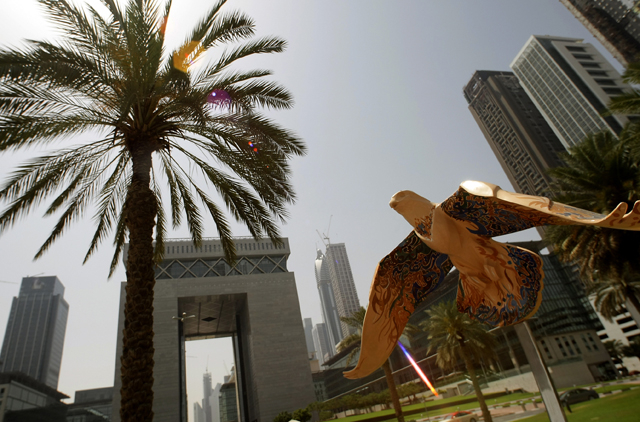“In Dubai, [a company] is ideally placed to connect markets within the Middle East, North Africa and the Indian subcontinent by land, sea or air,” Saeed Mohammad Al Awadi, CEO of Dubai Export Development Corporation, told US business representatives, while touring the US in mid-March. “The free zones and industry clusters in the emirate offer the best international practices in competitive export processing and logistics.” These advantages, he added, would enable companies to “move closer to overseas clients and target new and emerging markets effectively”.
The UAE has 34 free trade zones, hosting more than 25,000 companies across sectors. All free zones have a number of similar characteristics, “but there is a difference in price and what you can do with a company”, says Adriaan Struijk, Chairman of Dubai-based business consultancy Freemont Group, which focuses on the formation and management of free zone companies.
GN Focus spotlights some free zones that best cater to particular sectors.
Finance
The Dubai International Financial Centre (DIFC) focuses on corporate and private banking services, investment and capital markets, asset management and fund registration, insurance services, Islamic finance and other professional financial services. Among its advantages are internationally accepted laws and regulatory processes, a dollar-denominated environment and an international stock exchange with primary and secondary listings of debt and equity instruments (Nasdaq Dubai).
Al Maryah Free Zone, a new financial free zone in Abu Dhabi, caters to similar areas of interests, but focuses additionally on commodities trading and their physical delivery, as well as Islamic finance and Islamic banking. Upscale hotels, residences, shops, restaurants and even hospitals make the free zone an attractive proposition.
Trade and logistics
Jebel Ali Free Zone (Jafza), established in 1985, is the oldest and largest free zone in the UAE as well as the Middle East and North Africa and a busy hub for trade and logistics. With excellent infrastructure, thanks to being built around Jebel Ali Port, one of the busiest ports globally, the free zone is linked to the new Al Maktoum Airport and will be connected with Etihad Rail in future, allowing ease of cargo transport across the UAE, Saudi Arabia and Oman. Sultan Ahmad Bin Sulayem, Chairman of Dubai Ports World and Dubai Ports, Customs and Free Zone Corporation, told media earlier this month that Jafza registered 52 new companies last year alone from the automotive and aeronautics industry, bringing the total number of registered companies in these sectors to more than 435, from 60 countries. The zone hosts in excess of 7,000 firms, with more than 150 being Global Fortune 500 companies.
Dubai Airport Free Zone is in close proximity to Dubai International Airport and is among the UAE’s largest free zones. It hosts companies from key industries including electronics, pharmaceutical, engineering and building materials, aerospace and aviation, and logistics. “We support the national economic diversification policy to build a future beyond oil by encouraging global names from various industries to do business at Dubai Airport Free Zone,” Mohammad Al Zarouni, the free zone’s Director-General, said in his 2016 outlook .
Media, IT and telecom
Dubai Internet City is an IT park for companies targeting regional emerging markets. The cluster today represents the finest global names in computer technology including Microsoft, IBM, Cisco, Siemens, Oracle and Hewlett-Packard.
It is located adjacent to Dubai Media City, a busy free zone for news agencies, publishers, online media, advertisers, producers and broadcasters. Dubai Silicon Oasis also caters to IT firms, with infrastructure provided for light industrial units used for warehousing and manufacturing, and an incubation centre for start-ups, Reduced operating costs and subsidised lease rates are the other incentives.
Commodity trading
Jumeirah Lakes Towers Free Zone (JLT Free Zone) is one of the largest free zone developments in Dubai. Initially set up to operate the Dubai Multi Commodities Centre, a commodity market place for gold, silver, diamonds, precious stones and others, JLT has developed into a freehold community for businesses covering a range of commercial activities including services and consultancies. It offers a guaranteed 50-year income tax holiday, while excellent infrastructure and relative proximity to Abu Dhabi make it popular.
Best for affordaibility
Sharjah Airport International Free Zone, or SAIF-ZONE, is the largest free zone in Sharjah and particularly attractive for its lower fees when compared to Dubai and Abu Dhabi and a hassle-free approach to setting up business. It hosts a wide cross-section of industries and is home to including some of the biggest names in IT services and , media, consumer durables and , light to medium manufacturing and many others.
Ras Al Khaimah Free Trade Zone, or RAK FTZ, is also popular for providing the same or even more generous incentives as well, some that better those offered by than the free trade zones in Dubai and Abu Dhabi, but at lower cost, wooing companies with the promise of 25 per cent savings on business operations as compared to other emirates. It has four distinctive segments within the zone, a business park for office clients, an industrial park for heavy manufacturing, a technology park for trading and light manufacturing, and an academic zone for educational institutions.













